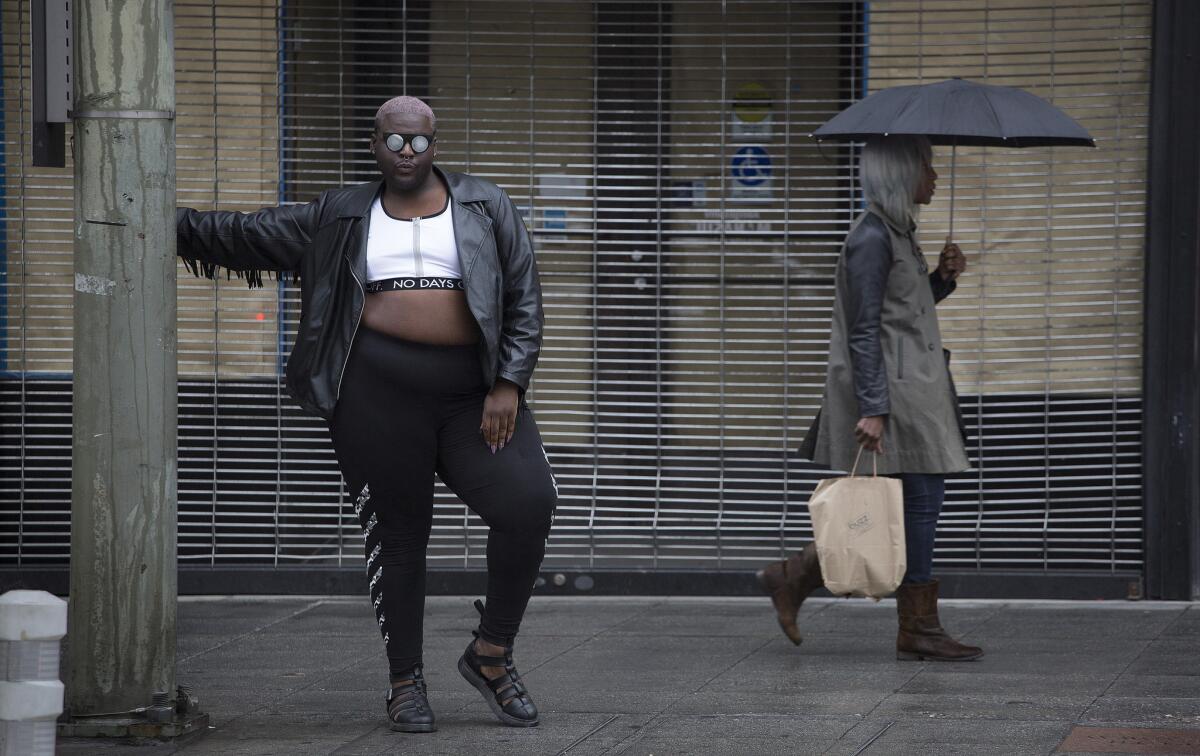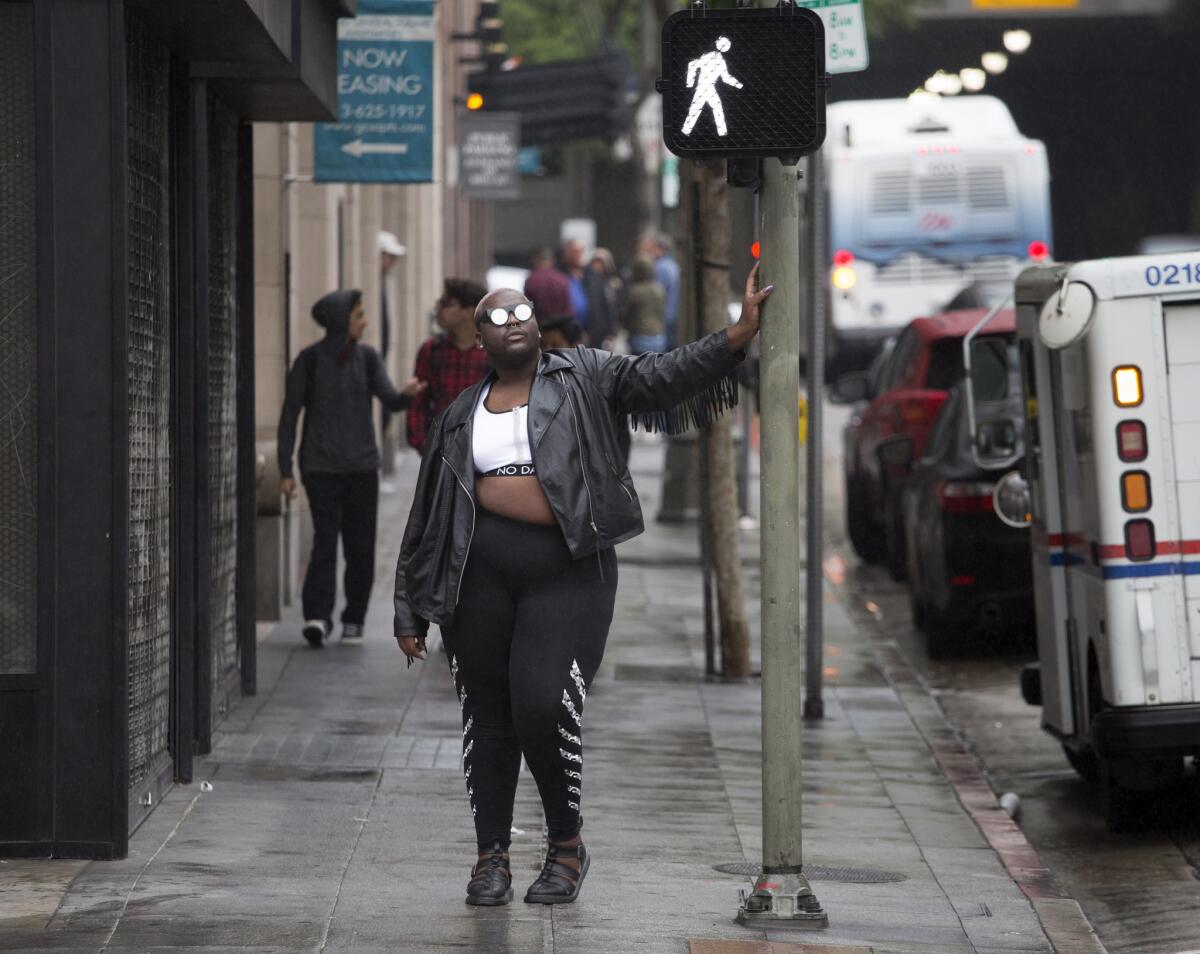This documentarian is fighting back against gay culture’s ‘No Fats, No Femmes’ mantra

“No Fats, No Femmes” documentary intro.
- Share via
Being overweight carries with it a social stigma. So does being a man who embraces the feminine. But for those in the gay community who live at the intersection of such identities, life can be like the worst case of double jeopardy. To Jamal Lewis, however, who is also black and who identifies as “gender deviant,” being fat and effeminate is a source of power and a subject worthy of exploration in a documentary titled “No Fats, No Femmes.”
“For me, I’m just interested in the spaces that people are afraid to occupy,” said Lewis, who uses “he-she” as a gender pronoun. “I think there is something to be learned from what we are most afraid of, and so, if that’s what I was taught to be afraid of, well [forget] that. I am the Fat Femme.”

Jamal Lewis, director of “No Fats, No Femmes,” poses for a portrait on Third Street and Broadway in Los Angeles, Calif.
Originally from Atlanta, Lewis is a second-year graduate student in media studies at the New School by day and “cultural worker, performance artist and freedom fighter” by night. While an undergrad at the historically black, all-male Morehouse College, he-she used queer social networking and dating sites to meet people. Sprawled on many of the profiles were “no fats, no femmes” -- along with things like “no blacks, no Asians, no ballroom kids.” Seeing the frequency of such language inspired Lewis years later to create a feature-length documentary to interrogate and explore race, desire and body image, and the ways in which they’re informed by media, pop culture and capitalism.
The documentary will feature interviews with five black people: a disabled person in South Africa; a queer New York rapper; a PhD student and blogger in Missouri; an agender writer of work on body positivity and a trans woman. Using archival research and performance art, Lewis’ goal is to discuss the many ways individual desires are rooted in problematic conceptions of varying identities.
Lewis has raised more than $17,000 from 550 backers for “No Fats, No Femmes,” which is still in pre-production. The attention he-she has received, which includes support from the gay dating app Jack’d and a mention from Tribeca Film, has taken him-her across the country to speak on body and femme positivity, including to Cal State Los Angeles.
The Times spoke with Lewis, who is known online as Fat Femme, following his-her recent West Coast visit about the documentary -- which is slated for a 2017 completion date -- about how (black) people “fail gender” and how gender deviant and trans people fit into the Black Lives Matter movement.
The problem is that many people are gender complacent. They are comfortable with how they understand and see gender because of what it affords them.
— Jamal Lewis
What does “no fats, no femmes” mean?
The “no fats, no femmes” ideology is often used by gay men [on dating sites] situating their desires within a framework that excludes particular kinds of bodies, mostly those fat, feminine, disabled, HIV positive and the list goes on. Anything that reminds them of what the world thinks it means to be gay, they shun away from. Put simply, it’s prejudice masked as preference.
Where did you get the idea to explore the thought process behind this statement in a documentary?
I have always admired the work of Marlon Riggs. I thought for a very long time about what he’d be talking about today had he still been alive and making work as someone who in the 1980s dared to talk about his life at the intersection of being black and gay. He wasn’t interested in being seen in fragments and put out a very visual and explicit narrative [titled “Tongues Untied”] that was really inspiring to me. I wanted to talk about [what] I was experiencing [while trying to date] using that as a model.
In the film’s introduction you quote Mark Aghuar’s “A Litany for My Heavenly Brown Body” which rejects whiteness, beauty and privilege while at the same time blessing the “sissies, trans, high femmes.” What about that work made you want it as the start of the documentary?
If you’re taught to be afraid of and move away from the body that you occupy, you never see a possibility of living in that place. I thought that what Mark was exploring spoke beautifully to the message I wanted to convey with this film because it’s like I’m washing myself clean of all these things that I was told I needed to be to be accepted. It deeply resonated with me, so I wanted it as something to set the tone and let you know I’m not about to play with you.
You say that the documentary focuses on the “politics of desirability.” Explain what that is.
For so long, ideas around sex and sexuality have been relegated to the bedroom. That is so because people are afraid of what it means to engage the messiness of our desires and how it controls a lot of our lives outside of the bedroom. I’m thinking of desire as both a cognitive and emotional phenomenon that is informed by the environment around us and the media we consume. And we know from feminist scholarship that the personal is political. The things that happen in our private lives very much so influence and determine how we show up in public.

Why was it important for you to have an all-black cast?
It meant a lot for me to have an all-black cast because so many other [films] don’t, or they can’t commit to an all-black cast because they want the film palatable to a certain kind of audience. It means more to me that I’m doing it in a way that honors how I show up in the world and the people around and most dear to me. I also chose to rock with an all-black cast and crew because black lives really do matter to me, and when we center them in critical conversations, we all get free. I want the kids of tomorrow and future generations to know and be proud of my decision and the reflection they see when they watch the film. I want my people to see themselves and feel seen.
But some might say the politics of desirability also affect white people. Is there space for them?
I think they have a space as listener. I’m not excluding them from the conversation, but it’s really important for me [to have an all-black cast] because whiteness is often a standard in conversations around beauty. I didn’t want white talking heads talking about these ideas because they are deeply implicated.
You crowdfunded $17,384 as a first time filmmaker. What does that tell you about the subject of your work?
For a long time I was afraid to share ideas because not only are we taught not to see ourselves, we’re taught not to believe in ourselves because of how we show up on a gender spectrum. [The support] showed me that there is an audience for the work that I want to produce and I don’t have to compromise my ideas or myself to do it.

“Art and activism together serves as a means to mobilize,” said Lewis.
How do the topics you’re raising in “No Fats, No Femmes” intersect with the Black Lives Matter movement and what seems like the exclusion of black trans and gender nonconforming people in that movement?
When you’re conditioned to only fight for a certain body, particularly black cisgender men, I think it’s hard to see anything outside of that as worth it because you only think black cis men are dying. No one thinks about the offset of that, the interpersonal violence that black women and gender deviant and effeminate people experience because of that. The problem is that so many people are what I have named gender complacent; they are comfortable with how they understand and see gender because of what it affords them and the convenience it provides them. People are afraid to wrestle with the fact that they too fail gender and are trans, in a way, and fail these normative notions of gender, particularly black people. People are afraid to show up for trans women in the streets because they are not really acknowledging how they are implicated in their murders and perpetuating transphobia.
What do you mean when you say people “fail gender”?
We see the conception of gender as this black, beastly, hyper masculine brute and this white, pristine, delicate trophy wife that’s meant to be protected from the black brute. If gender exists in those ways, so many people fail it because there is no space for nuance within that. Black women fail white womanhood. Black men fail the black brute stereotype. If we all understood how much we fail gender, we would approach conversations around trans-ness and gender nonconformity differently.
A number of recent videos of transgender and gender deviant people protesting police brutality and anti-LGBT laws using the voguing dance style have gone viral, including one of you. How can performance art be a tool for movement work?
For so long, the house and ballroom community has been shunned, but a lot of celebrities now are using it in their music videos and shows. Many don’t know that it is very important to black queer history because we understand vogue as embodied resistance. When [the founders] were kicked out of their homes [usually for being gay], they found a beloved community and found joy in what was supposed to be a tragedy and built a culture around that. Vogue is a dance of creative and resilient folks. To show up at a protest and do that, knowing the context behind the dance, is so powerful.
Voguing is no longer a thing that has to be at a club or in a private space. Art and activism together serve as a means to mobilize, to take up and disrupt space in a creative way in spaces where they may not be able to typically do so because of how they show up in the world.
What do you want people to take away from the documentary?
I want people to take away whatever they need from the film, most importantly healing, self reflexivity and honesty. May it be a mirror through which to engage their desires, internalized phobias and fears around who they are and what they have been told they are. And that’s my most honest response because sometimes I feel like I don’t know who exactly my work is speaking to and what people are taking from it. Most surprisingly, straight cis women and men are coming up to me after these talks at universities, community centers and movement spaces telling me how my work resonates with them, and they’ve helped me realize that this is bigger than [the] LGBT community and that it is bigger than all of our bedrooms. Desirability impacts so much around us, and I want healing for all.
Get your life! Follow me on Twitter: @TrevellAnderson.
ALSO
Here is why Hollywood also has an LGBT diversity issue
J.K. Rowling makes her annual apology for killing off ‘Harry Potter’ characters
Hulu is developing a cable-like package of channels
More to Read
Only good movies
Get the Indie Focus newsletter, Mark Olsen's weekly guide to the world of cinema.
You may occasionally receive promotional content from the Los Angeles Times.











